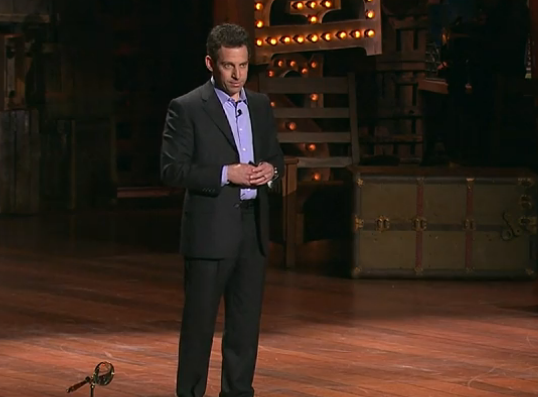And we know that it's possible to move along this continuum
我们知道我们可以解决这些持续已久的问题
towards something quite a bit more idyllic,
走向一个较为理想的状况
to a place where a conference like this is even conceivable.
像我们现在这样,齐聚一堂,和平讨论
And we know -- we know -- that there are right and wrong answers to how to move in this space.
我们知道,清楚知道,想要达到这样的境界,有对的,也有错误的方法
Would adding cholera to the water be a good idea? Probably not.
在水中加入霍乱病毒是对的吗?大概不是
Would it be a good idea for everyone to believe in the evil eye,
每个人都相信邪恶之眼的魔力
so that when bad things happened to them they immediately blame their neighbors? Probably not.
于是当某些不幸事件发生,他们马上就开始怪罪他们的邻舍?大概也不是

There are truths to be known about how human communities flourish,
我们应该去理解人类社群迈向繁荣的方法
whether or not we understand these truths.
无论我们现在能不能理解
And morality relates to these truths.
或把这些事实和道德做联结
So, in talking about values we are talking about facts.
当我们讨论价值,我们就是在讨论事实
Now, of course our situation in the world can be understood at many levels --
世界的现况可以用很多不同层次来看
from the level of the genome on up to the level of economic systems and political arrangements.
从染色体的层次一直到经济体系和政治协议的层次
But if we're going to talk about human well-being we are, of necessity, talking about the human brain.
但如果我们回去思考人类幸福的议题,我们必须谈到人类的大脑
Because we know that our experience of the world and of ourselves within it is realized in the brain
因为我们知道我们对世界的看法、我们的体验和感知都是由大脑建构的
whatever happens after death.
无论死后会怎样
Even if the suicide bomber does get 72 virgins in the afterlife, in this life, his personality
就算背着炸弹自杀死后能得到72个处女,在此生,他的人格
his rather unfortunate personality -- is the product of his brain.
这令人遗憾的人格,也是由他的大脑所产出
So the contributions of culture -- if culture changes us, as indeed it does, it changes us by changing our brains.
于是,文化的贡献是,是因为文化会改变我们的想法,也就是改变我们大脑的思考模式











